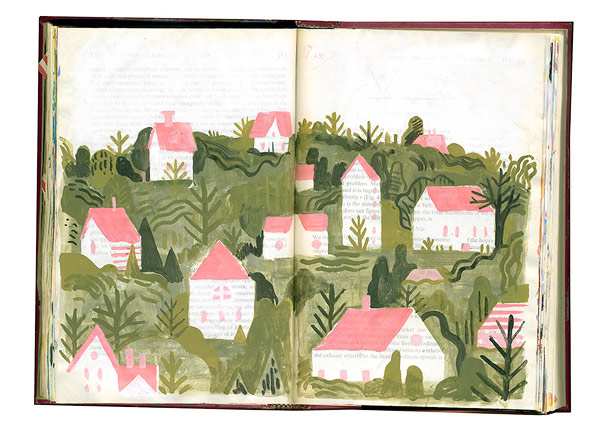Image: Julianna Brion
I’ve been reading a lot these days – novels, essays, and online articles about reading novels, essays and online articles. My own reading has been voracious and omnivorous – largely because the rest of my life is limited to being home with three-year-old twins and reading The Magic School Bus, Frog and Toad are Friends and Mr. Tiger Goes Wild.
So I do not have “reading insecurity,” as defined by Katy Waldman in a recent Slate article of the same name. Instead of “the subjective experience of thinking that you’re not getting as much from reading as you used to,” I fear I am in danger of taking too much from it. As soon as the twins’ door closes on their naptime or my husband comes home from work I am counting the minutes until I can fix a cup of tea and curl up with a book. Then, at last, I can rejoin Eula Biss as she explores vaccination in On Immunity, or Cheryl Strayed as she hikes the Pacific Crest Trail, or Lucy Knisely as she travels across Europe and into The Age of License. Through these journeys I can leave struggles with socks and broccoli and tantrums behind.
But then I read Anna North’s New York Times essay “When Novels Were Bad for You,” and wondered if, in some ways, they still are. North uses Emma Bovary and Catherine Norland, (of Northanger Abbey) as examples of readers who are swept too far away by their reading, finding their actual lives either lacking or mistakenly fraught when compared to the romances and Gothic horrors in which they lose themselves. I’m older than they are, and living in a very different time and place, but even though I can indeed distinguish between fact and fiction, I feel the same sense of thrall when I read, and I relish it. But is this “bad” in the way 18th– and 19th century critics thought?
North quotes Margaret Cohen, a professor of French language, literature and civilization: “Novel reading was so absorptive, and that was seen as one of its dangers, in that it would divorce you from everyday life.” And here’s the thing – I do indeed want to divorce myself (if only temporarily) from my everyday life. I want to be in a more sophisticated world than my three-year-olds’. I want complex characters and elaborate language and mature themes and, at least occasionally, all the other things that go along with an R rating. I want to balance If You Give a Pig a Pancake with Breece D’J Pancake, Margaret Wise Brown with Margaret Fuller, Ms. Frizzle with Miss Jean Brodie.
When I look to literature to give me an example of this kind of reading I find it, disconcertingly, in Laura Brown from Michael Cunningham’s The Hours. Here is a mother who is disintegrating beneath the pressures of life with small children. Here is a mother who lingers in bed, reading, as Cunningham writes, “to lose herself.” He continues: “No, that’s not it exactly – she is trying to keep herself by gaining entry into a parallel world.” Here is a mother who aches to read just “one more page to calm and locate herself.” A mother who flees to a hotel room to read, to remain lost in what John Gardner calls the “vivid and continuous dream.” A mother who is reading Mrs. Dalloway, a book about a woman whose child is grown and who has the time and space to reflect about her life and the course it might have taken. A mother who, eventually, tries to kill herself.
I do not want Laura Brown for a model. I do not want my need for escape to take me so far. But I do need the balance that absorptive reading gives me. I need to “keep myself” by spending some hours each day in that parallel world, a world that exists alongside my circumscribed life, a world that will open again for me as the twins grow up and go to school – and begin a reading life of their own.


